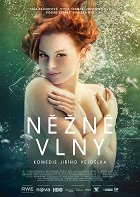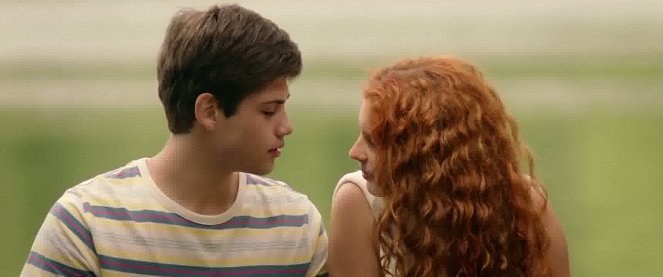Directed by:
Jiří VejdělekScreenplay:
Jiří VejdělekCinematography:
Vladimír SmutnýComposer:
Miloš KrkoškaCast:
Táňa Pauhofová, Hynek Čermák, Robert Cejnar, Lucie Šteflová, Jan Maršál, Gabriel Barreto de Carvalho, Natálie Halouzková, Jan Hartl, Vojtěch Dyk, Jan Budař (more)Plots(1)
Vojta is shy boy and his family is very odd. In the past his father tried to swimm across the English channel, he failed in his attempt, but now he wants from Vojta to be the number one swimmer. Vojta's mother - former child star in ice revue sees in him great pianist. But Vojta wants totally different thing, his attention is drawn by the beautiful redhead friend Ela, charming synchronize swimmer. Ela's plan is to go to France in november. She wants to escpe from comunist Czechoslovakia, its year 1989, therefore Vojta has to act quickly, if he doesn't want to lose his love. (official distributor synopsis)
(more)Reviews (4)
A pleasant summer comedy that showcases Jiří Vejdělek’s movies perfectly. But this time, I had a bit of trouble lasting till the very end of the movie. It’s not that long, but I found myself yawning at times. It’s not the fault of the great directing, the pleasant acting performances or the environment. The movie’s just like that; it grabs your attention, but then it’s just mediocre.
()
Surprisingly boxy, slightly abbreviated, yet irresistibly charming as a whole. Jiří Vejdělek sews together individual escapades of the main and supporting characters, not necessarily with a hot needle, but haste is often evident in the screenplay nonetheless. He is saved by the suitably enchanting Lucie Šteflová, lightly wooden-yet-paradoxically more believable Robert Cejnar, and most of all, the chameleon-like Hynek Čermák, who can perfectly sell even the most obvious lines. And as the whole amusing spectacle draws to a close, the smile doesn't seem to leave my face during those true tender moments. Once the central melody starts playing on the piano in full splendor, I realize that nostalgic stories about first loves have been able to knock me off my feet for quite a few years now, and apparently, that's not going to change.
()
Vejdělek's contribution to the topic of "how I lost my virginity during the Velvet Revolution." Fortunately, a good half of the film is quite gentle and tells the story of a classic Czech family in which mom (Pauhofová) is the sweet one and dad is the hothead (Čermák). And of course, their son's chosen one is a redhead...
()
Tender Waves is essentially a strange mishmash of various scenes grafted onto a not very interesting main storyline. It may not look like it from the official distributor's text, which you can see here, but consider that the departure of the classmate to her dream Paris occurs sometime in the last quarter of the film (if at all), and logically you have to ask: "What's been going on for an hour and a half?" Well, a lot of things. The biggest mistake is that I probably have a completely different sense of humor than Jiří Vejdělek. In addition to directing, he also wrote the script, partly based on his own memories, partly letting his imagination run wild, and I'm sure he finds all the stories extremely funny. The conservatory entrance exam and the tennis elbow, as well as what precedes the brawl in the projection booth, the punishment of the informer, and more. But I didn’t find them funny. I consider the best moments to be most of the scenes of the choleric father (perfectly played by the precise Hynek Čermák) and then a few moments of the kindly doctor Jan Hartl and the beautiful mother Tania Pauhofová (although I liked her mostly to look at). The rest of it, which hinges on the main character being played by an incredibly unsympathetic man (and it doesn't matter if he's older or younger, both boys are very similar in their unsympathetic nature), is terrible. For every good joke (there are about four in the film) there are ten bad ones, characters appear and disappear without any sense (the congregation)... Yes, it looks good (Vladimír Smutný's movie cinematography is always beautiful), many of the scenes have swing thanks to skillful direction, and it's not as endlessly stupid as Men in Hope, but I would like to ask Mr Vejdělek to stop writing scripts.
()

